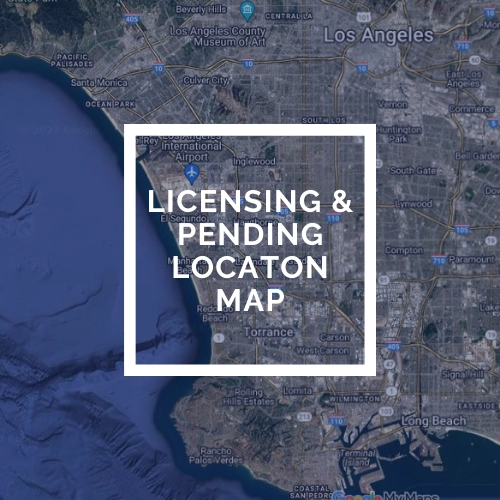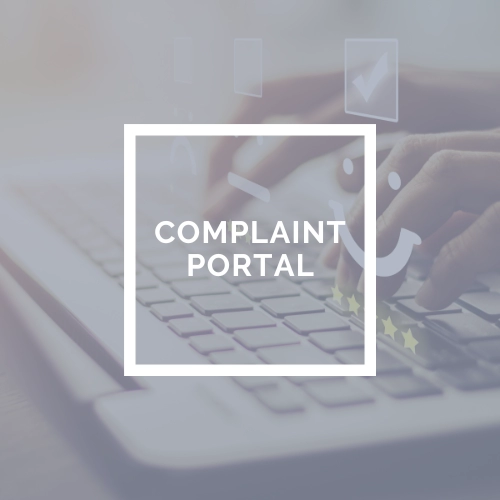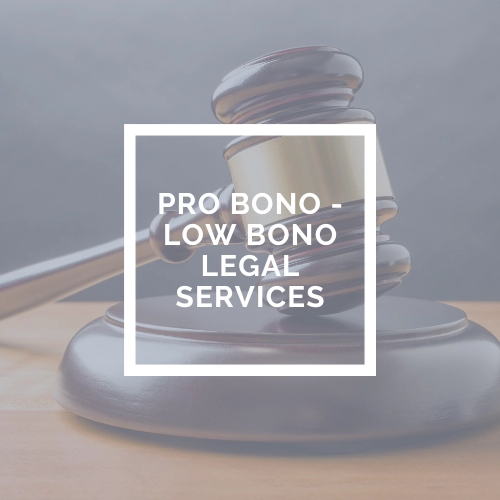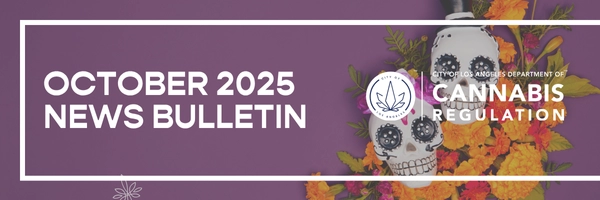
Greetings!
As we approach the last few months of the year, the Department of Cannabis Regulation is encouraging record and license holders to submit their renewal applications by the November 1, 2025, deadline to avoid extra fees and delays. Time is also running out for Social Equity Individual Applicants to take advantage of renewal fee waivers and should submit a completed renewal by November 1, 2025, to cover the full cost of their regular renewal fees. More information on renewals is below. Please, don’t miss out.
There were important legislative bills signed recently by California Governor Gavin Newsom. The new laws are: 1) AB 8 that permanently implements emergency legislation that aims to protect children from intoxicating hemp products; 2) SB 378 that hopes to aid consumers distinguish between legal versus illicit online cannabis marketplaces through new requirements of these businesses and, 3) AB 564 temporarily rolls back the cannabis excise tax to 15%. Read more about them in this bulletin.
DCR wishes you a Happy Halloween. Please remember to check out DCR’s retail map of licensed stores for your adult treats. You can even click on the toggle to filter for Social Equity owned businesses.
Regards,
Michelle Garakian
Executive Director
Department of Cannabis Regulation
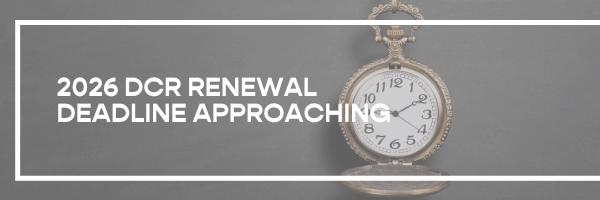
The Department of Cannabis Regulation (DCR) reminds individuals that the 2026 license and application record renewal period opened on September 2, 2025 and ends on November 1, 2025. About 30% of eligible records have submitted renewal applications as of October 8. Please note that all 2025 Application Records and Licenses will expire after 11:59 p.m. on Wednesday, December 31, 2025.
For additional information on the DCR Renewal process and how to pay, click here. To renew now, click here.
For the 2026 Renewal Period, DCR will utilize grant funding to provide fee waivers to Social Equity Businesses to cover the standard 2026 License and Application renewal fees. Please note that, to be eligible for the waiver, Social Equity Businesses must still complete and submit a renewal application during the regular 2026 License renewal period (no later than November 1, 2025) to demonstrate your intent to keep your record/license active. Licenses and Application Records will not be renewed automatically.
Also during this renewal period, DCR will allow various modifications such as updates to fictitious business names/DBA and business premises diagrams to be submitted without incurring extra charges. The renewal period is also an opportunity to review and update other contact types, such as Neighborhood Liaison, Consultant, Law Firm, and Authorized Agent. However, relocation, 100% ownership changes, and entity substitution modifications will not be permitted until the renewal process is completed. A webinar that reviews the types of record modifications allowed during the renewal period can be viewed here.
DCR also hosted several webinars about the 2026 renewal period. The first more general webinar on August 20, 2025, can be viewed here, and a second more in depth review of how to renew on August 27, 2025, can be viewed here.
Please note: As part of the 2026 renewal cycle, applicants/licensees are required to pay all other applicable outstanding fees (non-renewal related). These non-renewal fees are not available to be paid through the online system.
Please email DCRLicensing@lacity.org with any questions
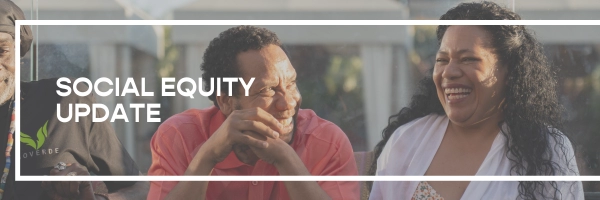
On June 17, Council introduced a Motion requesting DCR to pause the Phase 3 Round 3 retail license lottery in 2025. Council also requested the City Attorney prepare and present an Ordinance to amend LAMC Chapter X, Article 4 which extends the Social Equity Applicant exclusivity period for retail licenses.
The Motion is currently progressing through the legislative process, and no final action has been taken. For further details, please click here.
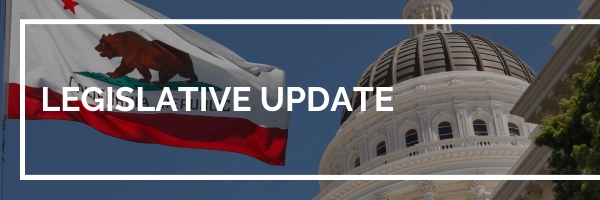
Assembly Bill 8
On October 2, 2025, Governor Newsom signed AB 8 (Aguiar-Curry) into law, a piece of legislation that integrates hemp-derived products containing intoxicating cannabinoids into the licensed cannabis market and sets restrictions on the incorporation of industrial hemp raw extract into products. The majority of this bill will not take effect until January 1, 2028, in order to give the industry and the State time to prepare for the new changes. However, there are key provisions operators should be aware of starting this upcoming January 1, 2026 to ensure compliance with the regulations that apply during the interim period.
Starting January 1, 2026, unless industrial hemp raw extract has a purity level greater than 99% and does not contain THC or synthetic cannabinoids, it cannot be incorporated into food, food additives, beverages, or dietary supplements – meaning retailers should not keep any of these products on their shelves. However, businesses should have already taken steps to comply with this rule, as the Governor’s previous emergency hemp regulations banned the sale of consumable hemp-derived products containing any detectable amount of THC or intoxicating cannabinoids.
During the interim period between January 1, 2026, and January 1, 2028, licensed cannabis operators should be aware of the following restrictions.
- Manufacturers can only use cannabinoid concentrates and extracts that were manufactured or processed exclusively from cannabis obtained from a licensed cannabis cultivator.
- Licensed testing laboratories may test industrial hemp, but no other licensees can possess, transport, distribute, manufacture, or sell industrial hemp on or from a licensed premises.
Starting January 1, 2028, any industrial hemp-derived products containing concentrated cannabinoids, with the exception of CBD, will fall under the definition of a cannabis product, creating the integration of industrial hemp into the licensed cannabis market. In doing so, these products will be subject to the regulations of the Medicinal and Adult-Use Cannabis Regulation and Safety Act (MAUCRSA), which include track and trace identification, advertising restrictions, quality assurance standards, and adherence to the cannabis excise tax, among others.
Senate Bill 378
Under existing state law, social media platforms are required to create and post a policy statement regarding its own policy on the use of its platform to illegally distribute a controlled substance, and must also include a link to its reporting mechanism for illegal or harmful behavior, if one exists. SB 378 (Weiner) builds upon this requirement and places new obligations and liabilities on online marketplaces where advertising or sales of illicit cannabis or hemp products occur. Specifically, online cannabis and hemp marketplaces, starting July 1, 2026, must address in their terms of service:
Click here to read more.
- Whether the platform permits advertisements from or business information about unlicensed sellers of cannabis to be viewed by Californians on its marketplace
- Whether the platform verifies that a seller is licensed by the Department of Cannabis Control. Platforms that don’t verify licenses must include a specified warning graphic for consumers to acknowledge and click through.
The legislation strictly prohibits marketplaces from engaging in unlawful paid online advertising related to unlicensed sellers of cannabis and cannabis products, intoxicating hemp products, or unregistered hemp products. It also requires that the marketplace create a clear and conspicuous mechanism to report illicit sales and advertisements. Failure to comply with these requirements can result in heavy civil penalties. Specifically:
- Failure to verify a seller’s license or include a specified graphic warning gives each user standing to bring action against the platform, entitling plaintiffs to a civil penalty of $250,000, plus attorney fees and costs.
- Platforms that engage in unlawful paid online advertising and are a factor in facilitating the sale of illicit products to consumers will be held liable for any damages caused to the consumer, to the same extent a retail store is held liable for selling a defective product at its premises.
- Damages for the above violations are doubled if the marketplace had actual knowledge that the product was unlicensed cannabis or intoxicating or unregistered hemp. Damages are tripled if the victim is a minor.
Assembly Bill 564
Following the July tax hike that raised the cannabis excise tax to 19%, AB 564 (Haney) temporarily reverts the rate back to 15% starting October 1, 2025, and until June 30, 2028. Though, the rate will have to be reevaluated and adjusted every two years, starting in the 2028-29 fiscal year, by a percentage that will generate revenue to offset a previous elimination of the cannabis cultivation tax. The rate cannot exceed 19%.
When Proposition 64 passed in 2016, the original language contained two State taxes on cannabis - a 15% retail excise tax and a weight-based cultivation tax. The cultivation tax brought in considerable revenue for the State, but was also considered a heavy tax burden on cultivators. This led to the introduction and passage of AB-195 in 2022; legislation that eliminated the State’s cultivation tax and instead called for adjusting the cannabis excise tax rate periodically to make up for the revenue loss. This is the reason the excise tax rate increased to 19% on July 1, 2025, as it was one of the main provisions of AB-195.

| Q&A Virtual Lunch: Final One of 2025 RSVP and pre-submit questions for this final edition of the Q&A Virtual Lunch webinar for 2025 with Assistance Executive Director Jason Killeen on October 29, 2025, at noon. You can RSVP and submit questions here and attend here. |
| Click the Jobs Board image for job postings in the cannabis space, or to list that you are hiring. | 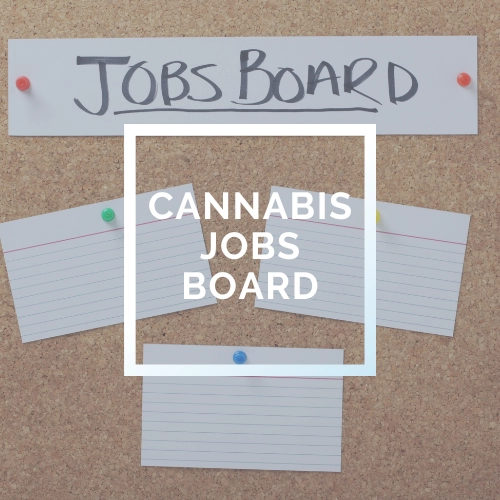
|

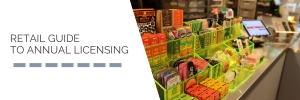
| 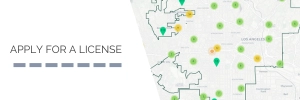
|
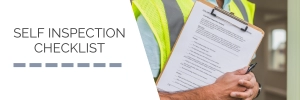
| 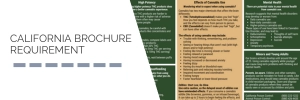
|
Don’t forget to follow us on social media:

